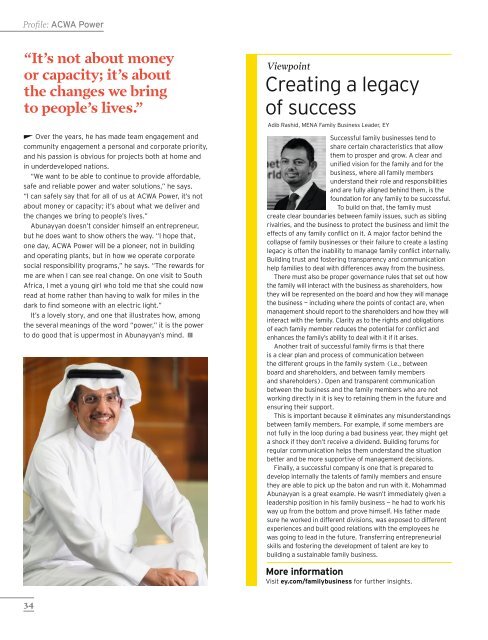Exceptional
ey-exceptional-2016-uki-book
ey-exceptional-2016-uki-book
You also want an ePaper? Increase the reach of your titles
YUMPU automatically turns print PDFs into web optimized ePapers that Google loves.
Profile: ACWA Power<br />
“It’s not about money<br />
or capacity; it’s about<br />
the changes we bring<br />
to people’s lives.”<br />
Over the years, he has made team engagement and<br />
community engagement a personal and corporate priority,<br />
and his passion is obvious for projects both at home and<br />
in underdeveloped nations.<br />
“We want to be able to continue to provide affordable,<br />
safe and reliable power and water solutions,” he says.<br />
“I can safely say that for all of us at ACWA Power, it’s not<br />
about money or capacity; it’s about what we deliver and<br />
the changes we bring to people’s lives.”<br />
Abunayyan doesn’t consider himself an entrepreneur,<br />
but he does want to show others the way. “I hope that,<br />
one day, ACWA Power will be a pioneer, not in building<br />
and operating plants, but in how we operate corporate<br />
social responsibility programs,” he says. “The rewards for<br />
me are when I can see real change. On one visit to South<br />
Africa, I met a young girl who told me that she could now<br />
read at home rather than having to walk for miles in the<br />
dark to find someone with an electric light.”<br />
It’s a lovely story, and one that illustrates how, among<br />
the several meanings of the word “power,” it is the power<br />
to do good that is uppermost in Abunayyan’s mind.<br />
Viewpoint<br />
Creating a legacy<br />
of success<br />
Adib Rashid, MENA Family Business Leader, EY<br />
Successful family businesses tend to<br />
share certain characteristics that allow<br />
them to prosper and grow. A clear and<br />
unified vision for the family and for the<br />
business, where all family members<br />
understand their role and responsibilities<br />
and are fully aligned behind them, is the<br />
foundation for any family to be successful.<br />
To build on that, the family must<br />
create clear boundaries between family issues, such as sibling<br />
rivalries, and the business to protect the business and limit the<br />
effects of any family conflict on it. A major factor behind the<br />
collapse of family businesses or their failure to create a lasting<br />
legacy is often the inability to manage family conflict internally.<br />
Building trust and fostering transparency and communication<br />
help families to deal with differences away from the business.<br />
There must also be proper governance rules that set out how<br />
the family will interact with the business as shareholders, how<br />
they will be represented on the board and how they will manage<br />
the business — including where the points of contact are, when<br />
management should report to the shareholders and how they will<br />
interact with the family. Clarity as to the rights and obligations<br />
of each family member reduces the potential for conflict and<br />
enhances the family’s ability to deal with it if it arises.<br />
Another trait of successful family firms is that there<br />
is a clear plan and process of communication between<br />
the different groups in the family system (i.e., between<br />
board and shareholders, and between family members<br />
and shareholders). Open and transparent communication<br />
between the business and the family members who are not<br />
working directly in it is key to retaining them in the future and<br />
ensuring their support.<br />
This is important because it eliminates any misunderstandings<br />
between family members. For example, if some members are<br />
not fully in the loop during a bad business year, they might get<br />
a shock if they don’t receive a dividend. Building forums for<br />
regular communication helps them understand the situation<br />
better and be more supportive of management decisions.<br />
Finally, a successful company is one that is prepared to<br />
develop internally the talents of family members and ensure<br />
they are able to pick up the baton and run with it. Mohammad<br />
Abunayyan is a great example. He wasn’t immediately given a<br />
leadership position in his family business — he had to work his<br />
way up from the bottom and prove himself. His father made<br />
sure he worked in different divisions, was exposed to different<br />
experiences and built good relations with the employees he<br />
was going to lead in the future. Transferring entrepreneurial<br />
skills and fostering the development of talent are key to<br />
building a sustainable family business.<br />
More information<br />
Visit ey.com/familybusiness for further insights.<br />
34


